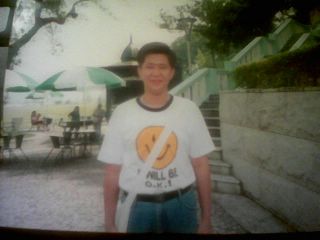winter 12月20日 打 "邊" Lo 名單
Author: Anton
姓名
1歐淑婷 Candice
2 Antonio Costa
8郭妙瑜 Kerria
9林智綺 Stephanie
10陳安琪 Angela+
11黃巧娜 Kola
13許 寧 Musum
15王傳斐 Lucy+
16冼嘉慧 Ada
17鄭君熾 Jordan+
18阮笑群 Jessie
20郭美惠Mia
21李威朗Vincent
24 郭惠恩 Fiana
25 鄧曉恩 Ian
26 黎靜儀 Esther
27 王雪嫻 Souveni
28 吳依雯 Nakita
1.鄭立君 (Fennie)
3.嚴啟俊 (Cyrus)
4.黃邢宜 (Iris)
5.趙惠萍 (Sandy)+
6.尤雅雯 (Joanna)
7.黃慧英 (Wendy)
9.蘇育明 (Rene)
11.呂倩姬 (Annie)
14.周翠琪 (Katy)
17.李偉業 (Arie)
KUSA
COLA
comment send me email: c.anton510@gmail.com


"We wish to see Jesus" (Jn 12,21)
Author: Anton
每當我閱讀教宗的文告,從一段至兩段說話中,總會發挖到無限的智慧,應該形容為,沒法以文字表逹的既深層又廣闊的知識。見聞和道理完美地以文章表逹,是一件藝術品。
為了來臨的第二十屆普世青年節,教宗在 2004年德國科隆的青年大會叮囑各位深入探討︰ “我們想看見耶穌”(若12:21)這句話是某幾位 “希臘人”向宗徒們提的要求,走到基督跟前,他們抱有自由和自願的慾望,來尋求真理。預感找到他們心中重大問題的答案。
教宗就此邀請年青人效法這些“希臘人”,學習“追尋”是應出於內心,追尋生命意義的需要,而不應只出於求知心的,然而這也有價值,追尋的過程應首先歸心靜思,從內心產生看見天主的心願,以信德去邂逅天主,而基督信仰不只是一套教義這麼簡單。之後我們則要用肉眼在世事和他人臉上尋找他;同時也要藉祈禱和默想天主聖言,以靈目來尋找祂。不論男女,各人心中都有這股要看見天主儀容的慾望,而言儀容,天主已在耶穌身上啟示給我們了。另外,教宗講解甚麼是本性和自由。
“人類本性最難能可貴之處,就在於他的聖召,並能與天主四目交投地彼此交流,從而改變自己的生命。要能看見耶穌,就先要讓自己被祂看見。”
“真正的自由,在於有能力選擇我們為了他而受造的那位,並樂意讓他統治我們的生命。”
還有,提醒我們,愛是生活和目標︰
“因為我們是為了你而受造,除非安息在你內,我們的心將得不到安寧”(奧斯定”懺悔錄”)
“人若為自己的朋友捨掉生命,再沒有比這更大皂愛情了”(若15:13)
“凡你們對我這些最小的兄弟中的一個所做的,就是對我做的”(瑪25:40)
教宗在一九八四年,把一個巨型木十字架交予普世青年,直至二十週年的今年抵達科隆並再度邀請青年,接受基督的十字架,攜它把真理宣揚各地,是彷效 “希臘人”和解放慾想看見耶穌儀容的好奇,在朋友和同輩當中,我們是背付著傳福音的責任。
By茶理先


沉默的羔羊 - quote from my friend
Author: Anton
「民」這個字的源頭,似乎已決定了中國人民的命運:「民」的甲骨文寫法是一幅以針刺眼的會意圖畫。古代奴僕被發配之前,得先被弄瞎一只眼睛,因為瞎掉一眼,對經濟性的勞役之事不至有大影響,但反抗作亂的能力則因此大傷,因此,在不顧及受刑者的真實感受情況下,是很有效管理方法。 古語云:「國以民為本。」孟子亦云:「民為貴,社稷次之,君為輕。」國家是手段,人民是目的,國家是為保障人民利益而存在和運作的管理機器。既涉及管理,必包含政治;既包含政治,必衍生政客間的利益衝突。最終,如果政治制度不完善,人民利益便會岌岌可危。 「世界潮流,浩浩蕩蕩;順之則昌,逆之則亡。」全球政治從歐洲啟蒙運動開始,正趨向自由民主化,連信奉從原理上不可能達至民主政治的社會主義的共產黨,也打著「人民民主專政」的旗號,搞搞民主政治形式,放些舉手機器在「議會」中,混水摸魚,愚弄人民。這時的「民」,可真是「以針刺一眼」了:連認識事實也做不到,遑論「反抗」。 澳門份屬葡萄牙前殖民地。葡萄牙乃西歐國家,在四百多年對澳門的殖民統治期間,理應對澳門的社會價值和人文思維有所影響,為澳門帶來中西文化內容的互相衝擊和輔成。但現在看到結果是,澳門人對參與社會建制的積極性,甚至人文素質和批判思維,跟內地同胞相比,差距不遠。 澳門特別行政區政體,基本上是行政、立法、司法三權分立,卻以行政主導。 行政長官由「代表」澳門四十多萬市民的三百名選舉委員會委員「一人一票」選出。選舉委員中有一百個來自「工商金融界」,「文化、教育及專業界別」和「勞工、社會及宗教界別」各八十個,由屬於該界別或界別分組的已進行選民登記之社團提名,並派出最多十一位代表「一人一票」選出。 立法會議員產生方法分直選、間選和委任三種。委任不必多提。直選和間選議席分別有十個,直選以比例代表制進行,間選則是以功能組別形式,由各界別選出代表界別利益的議員。民主就是由民作主。澳門號稱循序漸進發展民主,然而人民如沒足夠智慧,民主就會變得不真實。 澳門人觀察和思考能力皆低下,不知道表面分家的各範疇深入內在的緊密關聯,就如只懂頭痛醫頭,腳痛醫腳的黃綠醫生一樣。澳門人自命有著中華民族的「務實」傳統,只顧眼前「生存」「餬口」問題,甚麼政治問題,甚麼政府施政,只是高官、商家和「唯恐天下不亂」的「好事分子」管的事。 人類是社會的動物,是政治的動物。只要不是流落荒島孤獨終老,你就得與人群居。群居涉及資源分配,不論是市場主導還是政府指令,都是管理問題,管理不免政治,政治就是社會運作的最高權力。即使經濟再好,如果沒有清明高效的政治管理資源,只會是帳面上無意義的數字,無良資本家中飽私囊的證據和拉高堅尼系數的憑藉,人民根本不能享受經濟增長帶來的好處。偏偏澳門人不明此理,以為「食飯」問題和政治時事各不相干,以為政府運作與自己無關,以為星斗市民不應好管閒事,隨隨便便有飯可食,有瓦遮頭,有工賺錢便算。這是人文素質和思考能力的問題。 選舉是民主的基本,因為管治者的服務對象是人民,他們的權力要由人民授予,才能名正言順。偏偏澳門普遍市民因為「務實」,以為眼前餬口最關緊要;餬口問題已解決,便發揮中國人的「美德」:知足常樂──管甚麼政治?現在那個政府已經很好,還反甚麼?不知足,不感恩圖報;做人不能忘本,要飲水思源云云。 中國人迷信英雄,希望英雄出生打救自己,為窮苦大眾打江山,中國人數千年來心甘受專制統治,與此不無關係。國家是人民的工具,救國的英雄其實是人民本身,與其靜坐等待英雄出現,倒不如自救。自救需要人民團結一致,積極投入社會建制。 選舉是人民投入社會建制和運作的重要一步,偏偏澳門人以為小小蟻民之力量羸弱,一票半票根本不能改變甚麼。立法會議員與行政高官無異,與自己關係疏遠,所以選舉個甚麼人,根本不需要深入考慮,只憑一時感覺,認為那人「幾好」,就投他的。既以為對自身利益沒幫助,當遇上候選人向自己行賄,更會來之不拒。基於「受人錢財,與人消災」的傳統「美德」,行賄者奸計得逞,得以進入議會,方便為自己圖利。 最大問題,不用多說,是澳門人不明白人民在建制中的力量何在。正如人們亂拋垃圾最響亮的藉口,就是「我不丟,人家也會丟,到最終還是差不多,倒不如與自己方便」,他們妄想以一己意志控制社會前進方向,以一張選票左右政治發展勢頭,然而自知力弱,不可能做到,索性放軟手腳,甚麼也不理,反正「我走此方向,人家不知會否跟隨,不如不做」。 澳門人沉默怕事,遇上不公平情況也噤若寒蟬,同樣道理,以為人微言輕,「窮不與富鬥,富不與官爭」,索性逆來順受,「安分守己」,不「多管閒事」,「自掃門前雪」,以「明哲保身」,亦避免多生事端,破壞「清靜無為」。政府部門庸政害民,有誰會挺身而出,仗義執言,攘除姦凶?事物背後的原理和好壞不是一目了然的,它們都隱藏在我們所見的現象世界之後,要發現它們,就要深入觀察和思考,偏偏澳門人不肯思考,不肯想想事物背後的運作和牽涉到的其它範疇和潛在問題。有時人民明知問題存在,也不肯站出來提出反對聲音,只懂說句「算啦」虛應過去。 行政長官選舉,本身屬於間選性質,已沒有太廣泛的民眾代表性;況且選委選舉,以社團為投票單位,作為社團代表的投票人,本身非獨立個體,投票意向不屬於個人,而源於社團。不只如此,在大多數界別和界別分組中,候選人數量與其界別獲分配名額是相等的,這些候選人都自動當選而無需再經投票程序。換言之,選舉委員是由各社團領導私下協商產生的,這樣的選委,還有甚麼代表性?這樣的「選舉」,怎樣體現民主原則?怎樣讓人民參與政治?怎樣循序漸進推行民主政制? 偏偏受害最深的澳門人民竟不以為然,以為特首選舉大局已定,且人選能力不低,故以眼前利益未受侵犯為藉口,繼續「安分守己」,不加思考背後問題。現在澳門社會持續「祥和穩定」,問題未被提出,未被論證,有如捕風捉影,杞人之憂。 又一次,區錦新議員向立法會提出關於賭博社區化的討論,在立法會以五票贊成,十四票反對,四票棄權遭到否決。旅遊博彩業應主要為旅遊娛樂服務,但現在各種各樣的投注站不斷向社區發展。投注站在博彩稅所佔比重輕如鴻毛,對社會風氣有著深遠而嚴重的負面影響。更值得留意的是,五票贊成票全數來自直選議員。如果只計直選議員的話,這次動議將會獲得通過。 這件「小事」,有多少澳門人知道?他們關心立法會的議事嗎?代議士在議會討論的都是民眾的切身大事,但澳門人都少有理會他們在甚麼議題上辯論過,遑論他們的立場。在這個例子中,自己的代議士根本不能代表自己的利益,已經被證實了,他們哼出個甚麼反對聲音?直選議員質素已經良莠不齊,再加上那些代表壟斷澳門政治運作的社團的間選議員,立法會的代表性早就名存實亡,但蟻民何曾心生怨氣?他們思考能力不足,不懂引申問題,不知這些看似遠在天邊的事情實際上深入影響到他們的利益;另外,澳門人秉承中國人「良好」傳統,事事不要去得「太盡」,不斷從應守原則退避三舍,卻不知自己愈退愈後,連自身利益也犧牲得七七八八也不知,只知「今日留一線,日後好相見」,避免人家秋後算帳。 無識,無能,無智慧,無參與,無批判思考,無積極承擔,甚麼也無,甚麼也會失敗;怕事,怕苦,怕思考,怕付出,怕變化改革,怕徒勞無功,甚麼也怕,甚麼也做不來。 見諸今者澳門金玉其外,粉飾太平,放眼鄰埠,事情卻剛好相反:政制跟澳門的一樣,行政機關的產生沒有市民的意願,立法會的民意代表性不足,加上人大釋法否決雙普選,並一錘定音,以家長身份決定把八百人行政長官選委會委員人數由八百人增至千二人,並維持立法會直選議席只有三十個,一席也不准加,算是「循序漸進」發展民主。但是香港市民卻以深入思維批判中央作為,和平理性的方式表達自己希望加快民主改革步伐。他們獨立思考甚麼路向最適合香港,對香港最有利益,不為政權發放的愛國理論左右。相對於香港市民以功利的理性的方式愛國愛港,澳門市民卻行上感性激情的愛國愛澳之路,手段一以國家政權等權威機關立場為標準。 同為西歐國家前殖民地,同為實行「一國兩制」的特別行政區,為甚麼兩地有著天淵之別?為甚麼兩地人民的思維和素質有著那麼大的差距? 葡萄牙和英國同處西歐,面臨大西洋,在世界航海史上佔著舉足輕重的地位,但相比起英國,葡萄牙的航海實力消減,國勢衰落,世界性影響力減退,從而令她在往後世界秩序上扮演的角色更形邊緣化,加上英國在文化基礎、經濟實力等方面上比葡萄牙優勝,啟蒙運動為英國造成重要影響,工業革命在英國完成,更令英國國力臻於鼎盛;兩者令英國在西方甚至世界文明發展得以擔當重要角色;後來英國對世界事務的積極參與和葡萄牙的立場基本保持中立,是引申的結果。 因以上種種,葡萄牙作為澳門前宗主國,未能令澳門與世界文化緊密接軋,因為葡萄牙本身在世界文明發展的重要性不高,加以參與世界事務態度消極,雖位處西歐民主國家文化區域,本國卻少受影響,所以雖然她統治了澳門四百多年,但未能為澳門人文素質、思維層次和社會世界觀發展帶來深處積極的正面影響。 相反,英國在古今世界文明發展潮流上舉足輕重,亦是民主國家的領頭車。歷代世界文化各領域中,英國都有作出貢獻;她積極參與世界事務,國際地位崇高,且因殖民地曾偏佈全球,其文化影響力廣播世界每個角落。與葡萄牙相比,英國作為西方文化的領袖之一,理所當然地令香港進入西方文明的殿堂,為香港市民帶來中西文化的衝擊,不至於像澳門那樣,幾乎成為中國式思維的一言堂。 尤其甚者,兩件歷史事件激化了兩地的思想分野。 一九六六年,中央文革小組宣佈全國進行文化大革命。同年,澳門親共派響應文革,發起反葡萄牙殖民統治的暴動,是為「一二.三事件」。顧名思義,親共派獲勝。成王敗寇,親共派強迫澳葡政府答應減低本身統治力量,並嚴禁國民黨在澳一切活動。葡萄牙對澳門的統治力量嚴重萎縮,遑論為濠江帶來文化衝擊。 明年,香港親共派見澳門同志大獲全勝,遂依葫蘆畫瓢,號召「無產階級」上街,發動反英「愛國」暴亂,是為「六七暴動」。顧名思義,親共派大敗。成王敗寇,在港親共派勢力被嚴重削弱,信任親共派的港人亦買少見少,是故香港市民愈益倒向西方文化。 我們讀歷史,為的是批判過去,審察現在,計劃將來,從前人的經歷中得到知識,從祖先的錯誤中得到教訓,而不只是懷緬過去,悲古傷今。知問題之所在,對重症而下藥,非治標而治本,改陋制以從善,方益民以利澳,使繁榮而安居,非只濠之受惠,亦中華之大福。 解決問題,民主自由;話是這樣說得容易,但前路有多崎嶇,有多長遠? 何特首誓言,會在第二屆任期促進澳門人文水平的提升,加快特區民主政治的改革。在現行政制下,政改仰賴特首的意志和力量。然而,行政長官選舉委員會委員,以前文所述的方式產行。換言之,社團是「代表」人民參與特首選舉,履行公民義務。 但社團可靠嗎?由澳門各大家族、行業和街坊力量組織的社團不在話下,而在這些傳統勢力以外的商界政客,更斥資拉攏甚至自組法定社團。 兩句簡單的句子描述了今日澳門的社團政治狀況,但情況會像聽上去那麼簡單嗎?稍為聯想和推理,就不難思考到,所謂體現「澳人治澳」、「市民當家作主」、幫助澳門全體人民行使「簡接選舉權」的選舉委員會,實際上只是傳統勢力(大家族、職聯及街坊頭頭)和地方財閥力量的角力,第三任特首人選,有可能是姓崔的,有可能是周的;總之,只會來自這兩大勢力,市民被架空,無權過問誰會成為他們的長官已不在話下,何特首民主人文改革的鴻圖大計,看來只會比百日維新持久一點點。



By People's Daily Online
Four Chinese economists, each awarded 300,000 yuan (36,280 US dollars), became the first group to receive the China economics prize Thursday.
The four laureates are Xue Muqiao, Ma Hong, Liu Guoguang and Wu Jinglian, whose theories have helped boost the market-oriented reform of China's economic system.
They have made great contributions to the improvement of China's socialist market economy system, the government's macro-control policies and the operation mechanism of micro-economy, said Vice Premier Zeng Peiyan, who attended the award ceremony.
Zeng said that partly due to the prizewinners' contributions, the previous 26 years had seen one of the most breathtaking economic transformations in history, praising Xue in particular as one of the fathers of China's economic research and a devoted and creative educator.
He encouraged other economic researchers to promote theoretic innovation and explore economic rules based on the situation of China's reforms and development. Zeng said he hoped that they contribute to the China's goal of building a "well-off society in an all-around way."
The 101-year-old pioneering economist Xue Muqiao was born in the waning years of the Qing Dynasty (1644-1911). In the 1930s, while China was in the grip of civil war, he carried out ground-breaking research into rural poverty. In the 50s he was an economic policy assistant to the country's highest decision-making body and in 1979 he published works widely regarded as the seminal guide to China's market-oriented transition.
Now bed-ridden with Parkinson's disease, Xue's daughter Thursday accepted the award from Vice-Premier Zeng Peiyan on her father's behalf.
The other three award winners Ma Hong, 85, Liu Guoguang, 82; and Wu Jinglian, 75 were all key figures in helping China move away from a planned economy.
Ma Hong, also absent from the ceremony for health reasons, was cited for his suggestions to restructure China's economy at a stable pace.
Wu, 75, the youngest of the quartet, was honoured for lending urgency and substance to State-sector reform by breaking the "iron rice bowl" a system which guaranteed life-long employment and perks like housing but led to inefficiency.
"I accepted the award as recognition of the efforts made by our generation of economists during China's reform process," said Wu, who still works as a researcher with the State Council Development and Research Centre.
Having won the gratitude and admiration of millions of small shareholders whose interests he has vociferously protected, Wu is also well-known for encouraging private investment and the entrepreneur culture.
He is not, however, resting on his laurels or tempted towards complacency with the dynamic economy.
"We have still have a long way to go to perfect the legal system in China's market economy," said Wu. "Only by matching the rule of law with the market economy can we achieve total success," he added.
The fourth award winner, Liu, is not fully convinced the free market has all the answers to the economy he received his award for a theory he put forward on government's role in the market economy.
"Only when the government performs its role correctly can we fully realize a socialist market economy," he said.
The China economics prize, established by China Macro-economics Institute and China Society of Economic Reform, aims at encouraging and rewarding scholars who made prominent contributions to the building of economic theories, policies and research methods.



By People's Daily Online
The research group on the strategy for China's modernization pointed out early this year ten major challenges ahead of China's economic modernization drive during the first half of the 21st century.
The ten challenges are: sustained and rapid growth of labor productivity; the transition from three-way economy to knowledge-based economy; agricultural modernization; sustained supply of energy and resources; maintaining financial stability; ecological modernization and the balanced development of economy and ecology; coordinated development among different regions and between cities and rural areas; overall enhancement of workforce quality; major improvement of the capability and efficiency of innovation; participation in globalization and safeguarding the national interest.
Along with the challenges, China will embrace three major opportunities during its economic modernization drive: information-based economy and economic globalization, green economy and bio-economy, and experience economy and cultural economy.
"We must make serious studies on these opportunities and should not miss them," said He Chuanqi, head of he research group.
He said, China had missed three historical opportunities for economic modernization: first, the spread of the First Industrial Revolution in 1793; second, the kick-off of the Second Industrial Revolution during 1842 and 1860; third, the technological transfer during the third industrial revolution from 1957 to 1976.
He said, the past 160 years were a period from slumber to awakening for China while the future one hundred years will see China catch up in its economic modernization drive. If we can seize the opportunities, brave and conquer the new challenges, China will realize the economic modernization and the great rejuvenation of the entire Chinese nation in the 21st century.



何必尋找所謂的天堂
原來我因為你
不想再去流浪
情願平凡 不擁有一切也無妨
有了你在心上 依然是天堂


How to Get A’s grade in research project?
Author: Anton
To get A’s grade, there are five areas of things we should do:
1. Structure and Clarity
2. Content and Understanding
3. Analysis/Evaluation/Synthesis
4. Application to Industry/Vocational Area
5. Research/Reading/Referencing
Structure and Clarity
Write in logical flow, clearly structured, well-focused and based around a sophisticated conceptual framework that supports analysis of complex issues.
Tips: Start writing with some key-works and plan chronological or cause-and-effect argument in point-form.
Your text may demonstrates a highly creative approach in constructing original and persuasive arguments.
Tips: Review and cut out ambiguous words
Professional command of vocabulary is very important, your grammar will lead to effective communication.
Tips: Be consistent.
Content and Understanding
You may show impressively high level of comprehension.
Tips: Factually faultless.
You may innovate and distinctively, displaying wide knowledge and perception.
Tips: Give more related example.
DO NOT ignore divergent opinions from a range of sources; it would not lead you to make appropriate argument. Go to understand the more subtle aspects of the subject.
Tips: Use “But” after writing the opposite opinion of yours.
Analysis/Evaluation/Synthesis
˙ Critical and original appraisal of contemporary issues/theory/abstract ideas/data/models.
˙ Authoritative, sophisticated and original arguments/solutions to problems presented
˙ The work critically appraises and(where appropriate) challenges the work of current academics.
˙ Thought provoking conclusions, demonstrating reflective thinking/new hypothesis
Application to Industry/Vocational area
Ø Mature critique and analysis of concepts in relation to industry/vocational area environment.
Ø Demonstrates thoughtful specialist insight and critically appraises contemporary industry/vocational area practice.
Research/Reading/Referencing
ü Evidence of extensive reading and effective literature searches with strong emphasis towards contemporary journal material.
ü Judicious and comprehensive use of references and quotations, demonstrating intellectual agility, and conforming precisely to the College Standard.
Conclusion:
The features of outstanding work are difficult to break down shown above. It is because of an increasingly holistic approach to grading being taken at A level. Reward is given to who had preparation and answer the question in own way. To learn and to become great powerful, when you begin you are success in half.
Written by Antonio M. da Costa
Source from Birmingham College- Generic Grading/Feedback Sheet



Term paper: Chinese Economy reform to adjusts WTO principles
Mini-Research project: After China's WTO accession, challenges of rural employment, challenges of urban employment.
1.
Manufacturing agglomeration as incentives to Asian FDI in China after WTOJournal of Asian Economics, Volume 15, Issue 4, August 2004, Pages 673-693Chyau Tuan and Linda F. Y. Ng
2.
Comments on Tuan and Ng: "Manufacturing agglomeration as incentives to Asian FDI in China after WTO"Journal of Asian Economics, Volume 15, Issue 4, August 2004, Pages 695-696Richard Hooley
3.
Trade reform in the short run: China’s WTO accessionJournal of Asian Economics, Volume 15, Issue 1, February 2004, Pages 1-31Lucy Rees and Rod Tyers
4.
Public investment and China’s long-term food security under WTOFood Policy, Volume 29, Issue 1, February 2004, Pages 99-111Jing Zhu
5.
China Economic Review, Volume 15, Issue 2, 2004, Pages 109-144S. M. SHAFAEDDIN
6.
The impact on China of its ascension into the WTOThe Social Science Journal, Volume 41, Issue 3, 2004, Pages 363-374Coldwell Daniel, III
7.
Will China's WTO accession worsen farm household incomes?China Economic Review, Volume 15, Issue 4, 2004, Pages 443-456Kym ANDERSON, Jikun HUANG and Elena IANCHOVICHINA
8.
China's WTO accession: impacts on regional agricultural income— a multi-region, general equilibrium analysis
Journal of Comparative Economics, Volume 31, Issue 2, June 2003, Pages 332-351Xinshen Diao, Shenggen Fan and Xiaobo Zhang
9.
The impact of China’s WTO accession on patterns of world tradeJournal of Policy Modeling, Volume 25, Issue 1, January 2003, Pages 1-41Zhi Wang
10.
Globalisation and sustainability: environmental Kuznets curve and the WTOEcological Economics, Volume 39, Issue 2, November 2001, Pages 185-196Clem Tisdell
11.
Assessing the WTO agreements on China's telecommunications regulatory reform and industrial liberalization
Telecommunications Policy, Volume 25, Issue 7, August 2001, Pages 461-483Bing Zhang
12.
China's new horizon: Challenges and opportunities from WTO membershipChina Economic Review, Volume 12, Issues 2-3, Summer 2001, Pages 103-106Guy Shaojia LIU, Xiaming LIU, Liming WANG and Wing Thye WOO


Pollshost
Author: Anton








Important ESSAYS AND SURVEYS in economic thought
Author: Anton
Classical
Cantillon's System
Quesnay's Tableau Economique
The Classical Ricardian System
von Neumann Systems
Neoclassical
The Marginalist Revolution of 1871-4
The Neoclassical Theory of Distribution
Walrasian General Equilibrium Theory
The Paretian System
Edgeworthian Exchange
General Equilibrium under Uncertainty
Socialist Calculation Debate
Mathematical Appendix
MACROECONOMICS
Growth Theory
Monetary Theory
Bullionist Controversy
General Glut Controversy
Business Cycle Theory
Neoclassical
The Neoclassical Macromodel
Monetarism
Neoclassical Growth Theory
Capital and Investment Theory
Keynesian
On Keynes's General Theory
The Neo-Keynesian World
Keynesian Business Cycle Theory
Keynesian Growth Theory
MICROECONOMICS
Neoclassical Theory of Production
Capital and Investment Theory
Marginalism Debates in the Theory of the Firm
Uncertainty, Information and Games
Choice under Uncertainty
Equilibrium under Uncertainty
Information Theory
Game Theory
OTHER ITEMS
Mathematical Appendix
Methodology and History of Economics
Economics Journals: A chronology
Journal Acronyms
The Walrasiad


HISTORY OF ECONOMIC THOUGHT- Schools
Author: Anton
SCHOOLS OF POLITICAL ECONOMY (Ancient-1871)
PRE-CLASSICAL
The Ancients and the Scholastics
The Salamanca School
The First Economists
Sir William Petty and the Mercantilists
Richard Cantillon, Jacques Turgot and Enlightenment Economics
François Quesnay and the Physiocrats
David Hume and the Scottish Enlightenment
Ferdinando Galiani and the Italian Tradition
Social Philosophers and Commentators
THE CLASSICALS
Adam Smith
David Ricardo, John Stuart Mill and the Classical Ricardian School
T. Robert Malthus and British Anti-Classical Economists
Jeremy Bentham and the Utilitarians
Jean-Baptiste Say and the French Liberal School
Jules Dupuit and the French Engineers
Continental Proto-Marginalists
Karl Marx and the Marxian School
The Bullionist Controversies
The Manchester School
Piero Sraffa and the Neo-Ricardians
The Neo-Marxians
NEOCLASSICAL SCHOOLS(1871-Today)
ANGLO-AMERICAN NEOCLASSICISM
W. Stanley Jevons and the Anglo-American Marginalists
John Bates Clark and the American Apologists
Alfred Marshall and the Cambridge Neoclassicals
Lord Robbins and the London School of Economics.
Frank H. Knight and the Chicago School
Milton Friedman and the Monetarists
Robert Lucas and the New Classicals
New Institutionalist Schools
CONTINENTAL NEOCLASSICISM
Léon Walras and the Lausanne School
Carl Menger and the Austrian School
Knut Wicksell and the Swedish School
Paul Samuelson, John Hicks and the Paretian Revival.
The Vienna Colloquium
Tjalling Koopmans and the Cowles Commission
Kenneth Arrow, Gérard Debreu and the Neo-Walrasian General Equilibrium School
Robert Aumann and the Edgeworthian Revival
ALTERNATIVE SCHOOLS
HETERODOX TRADITIONS
Utopians and Socialists
The Fabian Socialists
Gustav Schmoller and the German Historical School
The English Historical School
The French Historical School
Thorstein Veblen and the American Institutionalist School.
Joseph Schumpeter and Evolutionary Economics.
The Soviet Planning Economists
The Neo-Marxians/Radical Political Economy
Economics at the New School for Social Research.
KEYNESIANS
John Maynard Keynes
Joan Robinson and the Cambridge Keynesians
Franco Modigliani, James Tobin and the Neo-Keynesian Synthesis.
Abba Lerner and the American Post Keynesians
Robert Clower, Axel Leijonhufvud and Disequilibrium Keynesianism
Joseph E. Stiglitz and the New Keynesians
The Mandarins
THEMATIC SCHOOLS
Themes
Business Cycle Theory
Empirics and Econometrics
Imperfect Competition
Economic Development
Uncertainty and Information
Game Theory
Finance Theory
Other
The Nobel Memorial Prize in Economics
The American Economic Association
The Econometric Society
Economic Journals: A chronological account
Journals and their Acronyms
Methodology and History of Economics


Hospitality Management Strategies
Author: Anton
This is a very good book, provide many situation and explanation. Edited in year 2005. Written by Ronald A. Nykiel, an author(this book), business executive(IBM), lecturer(Harvard), professor (Dr. of University of Houston) issue around Mangagement(HR) and marketing.
Features of this book: Coverage of macro trends such as labor availability, new technologies, economic ups and downs, terrorism, security, and globalization. Presents an “applied/real world” focus on current trends which have substantial impact on management strategies.
Case examples directly linked to chapter concepts/key content, exemplify the strategy application. Stimulates discussions and conveys key terms for major managerial strategies.
Key terms and words defined at the end of each chapter as well as in the glossary. Allows students and instructors a quick reference of key definitions as well as reinforcing them.
Discussion questions and chapter summation at the end of each chapter.
Highlight boxes for link to business ethics and technology. Helps point out applications, considerations, developments, and potential future directions related to each chapter topic.


Economist NAME List
Author: Anton
Author Names
Abrams Ahmed Anderson Anderson Anderson, Jr. Armentano Arnold Backhouse Baetjer Jr. Barnett II Barry Bartlett Bastiat Batemarco Becker Bellante Benink Benson Benston Birken Block Blundell Boetie Boettke Böhm Böhm-Bawerk Bostaph Boudreaux Boyd Boyers Bradley, Jr. Brätland Bresiger Broussard Buchanan Butos Calcagno Caldwell Campan Cantor Caplan Carnis Chafuen Chaloupek Chamlee-Wright Cheung Chodorov Choi Clark Cochran Coddington Conway Cordato Cowan Cowen Craver Crespi Cubeddu Cwik Davis de Jasay de Soto DeBow Dempster Dempster Demsetz Desrochers Diamond Dieteman Dilorenzo Dolan Dorfman Dorn Dowd Dulbecco Ebeling Edwards Egger Ekelund Ekelund Ellig Elzinga Endres Fetter Foss Foss Gallaway Garello Garrison Garrison George Gertchev Glasner Gonzalez Gordon Graf Graham Greaves Greaves Gunning Haberler Hagemann Hamowy Harper Hayek Hayek Haymond Hazlitt Hébert Hefner Heilbroner Heilperin Henderson Hennings Herbener Higgs High Hirshleifer Hodgson Hoff Holcombe Hoppe Horwitz Hudson Huerta De Soto Hughes Hülsmann Hummel Hunt Hutt Ikeda Jaffe Johnson Juurikkala Kates Kauder Kaza Keizer Keizer Kinsella Kirzner Klein Knight Koppl Krecke Kroszner Kuenne Kuznetsov Laband Lachmann Langlois Lavoie Lawson Lawson Lewin Lingle Littlechild Long Machan Machlup Machovec Mackintosh Maclachlan Mahoney Maks Maltsev Mastin Mathews Mayer McCulloch Menger Mercer Mises Mises.org Moss Mueller Murphy Murrell Nataf Nozick O'Driscoll Jr. O'Neill Osterfeld Pack Padilla Paqu Pasour Jr. Pasour Jr. Paul Pellengahr Persky Petro Philbin Phillips Pongracic Pryor Raico Rashid Reekie Reisman Reynolds Ritenour Rizzo Robbins Roberts Rockwell, Jr. Roll Röpke Rose Rothbard Ruhl Salerno Salin Samuelson Sanders Sautet Schmidtchen Schohl Schuler Schütz Schwartzstein Scott Sechrest Sechrest Selgin Sennholz Shah Shah Shand Shearmur Shenoy Shostak Skousen Smiley Smith Smith Smith Smith Smithies Sowell Sraffa Steele Steele Steele Stiebler Streissler Strigl Stringham Stromberg Tabarrok Tamedly Taussig Taylor Teijl Terrell Thirlby Thomsen Thornton Timberlake, Jr. Tooley Trescott Tullock Ussher Van den Hauwe Vaubel Vaughn Vedder Vedder Vihanto Wagner Wainhouse White Wicksell Wieser Williamson Wilson Witt Witt Wonnell Wooldridge Yeager Young Yu Zlabinger
To commenters: Tell me who you know in this list?


大學生與讀者對話
Author: Anton
在第二四八號澳門觀察報頭版, 標題為 “與大學生談話” 的訪問文章, 有關內容盤算著今日的大學生, 話我們欠缺社會意識和面對時事的觸感。就這機遇, 我想大學生亦應親身回應解釋: 大學生眼中的大學生是怎麼樣的。
普遍的大學生均接受四年的專業教育、 能力的訓練等,在校園的生活與社會的生活無異,同樣會與到失敗、 挫折。 這些感覺可能是因分數落第,因為留級而不能作進一步鑽研,或者,個人能力不足, 特別是語言能力, 而形成障礙, 大學生會感到失敗; 大學之間存在嫉妒、 分歧和欺壓,或者,老師把學生分類的情況, 大學生會有到挫折感, 這些情況, 就家長是沒辦法介入的, 只好為兒女打氣, 我們社會的縮影就是大學生的生活。
雖然不是全世界的學士學位都是四年制和除了這種學位, 中學生畢業後還可以選擇高等專科文憑、 副學士學位、 培訓課程、 搖距課程或踏進社會工作。 但是,澳門的年輕人多數選擇四、五年的學士學位為自己投身社會的第一道梯級, 可是問題是:澳門年輕人需要這道形像門檻的梯級?當踏上這道梯級, 有些什麼會被肯定呢?是否增加了社會的觸覺和更加關心社會時事?回答這題, 筆者認為是因為澳門的大學生存在的問題是不關心整個社會, 但再深入了解,這種結果並不重要, 因為問題的 “成因”更顯得需要深入探討。
由一個現象可說明改變成因的重要大過結果: 在美國紐約市曼哈頓區, 以官僚主義營業的美思(Macy’s)同布魯明岱爾百貨公司(Bloomingdale’s), 它們的市場是走高級路線, 而另一面, 唐人街上的店舖以家庭式營業, 其市場是友善的顧客, 可見在同一個城市裡, 不同的市場以不同的市場制度吸引客源。制度從宏觀角度是非常重要的, 是它形成市場的, 而由市場的供求定律闡釋形成今日大學生問題的原因,有兩個:一,在過去,要求大學生關切社會可以說為,供求定律缺乏了需求, 就是當社會的各行業, 均以賭業為龍頭, 中小企以官僚形式運作, “聽命”已是對員工的最高要求, 使供求均衡點在最低水準, 那麼員工們, 即澳門的大多數勞動人口, 將缺乏了要關心社會的推動力。 因為社會上總有志願者關心社會, 這些人不是律師的兒子或議員的姪女, 只是憑著一顆心或者 一個原動力去關心社會, 可是澳門沒有城市論壇、 電台的聲音地方或沒有環境容納這個社群, 可以給一班人有充分的培養和資源來探討社會上每一個問題。結果是, 大學生不太關心社會, 而社會亦然運作。
反思, 如果世界不能改變 “成因”, “結果”總會相同。 大學生的角色就是結果的主演和改變因素的主導, 現今大學生的意願就是他日大學生的形象。“而作為未來社會的棟樑, 應貝有廣闊的世界觀及長遠的視野” , 澳門全球化已成定局, 在澳門所發生的事, “每處地方都不能置身事外”, 對現今的大學生, 這點已經很重要了。
今天社會上有多少資源, 或者, 那部份的社會層支持擁護人們去關心社會呢?我們是不能不講的。


First time
Author: Anton
新經濟",是指從1991年4月開始到當時的美國經濟。
中國經濟的真面目 社區經濟是甚麼?勞工不斷被邊緣化/重建社群及社區網絡/保育社區經濟政府
有責經濟是為人服務 一切為增產所擬定的(經濟)計劃,不應由其他理由確定,祇應為人服務而已。
振興經濟是解決財赤的關鍵,但不果斷解決財赤則會窒礙經濟發展,兩者關係互動。
論經濟/道德/法律的關系
文化與經濟是互為表裏、互相支持、 生活水平的快速提升經濟是如何影響世界所以
你話你唔喜歡 經濟? 我唔信



 Let our love be leaf in heaven.
To my pretty angel BB
Let our love be leaf in heaven.
To my pretty angel BB



